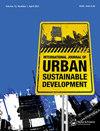通过容积率激励为低收入家庭提供负担得起的住房:尼泊尔加德满都Manohara定居点的案例
IF 2.4
Q3 ENVIRONMENTAL STUDIES
International Journal of Urban Sustainable Development
Pub Date : 2022-08-05
DOI:10.1080/19463138.2022.2103823
引用次数: 0
摘要
快速增长的城市人口与有限的城市基础设施之间的不匹配已经成为许多新兴城市面临的挑战。缺乏负担得起的住房导致了非正式定居点的迅速发展,加德满都的Manohara非正式定居点也不例外。本研究旨在调查马诺哈拉非正式住区的现状,并探讨容积率激励在提供经济适用房方面的可行性。对马诺原非正式住区的入户调查和FAR激励的模拟分析发现:首先,考虑到预算有限,政府对加德满都的土地几乎没有控制,一个专注于发展收益的规划工具是为低收入家庭提供住房的合适选择。其次,土地面积为5万平方的FAR激励模拟。加德满都的一项研究表明,50%的激励补贴可以为住房项目的开发商增加33-93%的额外利润,这对于公共利益的经济适用房是可以保证的。本文章由计算机程序翻译,如有差异,请以英文原文为准。
Affordable housing for low-income households through floor area ratio incentive: the case of Manohara settlement in Kathmandu, Nepal
ABSTRACT The mismatch between the fast-growing urban population and limited urban infrastructure has become a challenge in many emerging cities. The lack of affordable housing leads to burgeoning informal settlements and Manohara informal settlement in Kathmandu is not an exception. This study aims to investigate the current situation in Manohara informal settlement and examine the feasibility of floor area ratio (FAR) incentive in providing affordable housing. A household survey in Manohara informal settlement and simulation analyses of FAR incentive found the followings. Firstly, given the limited budget and little control over the land of Kathmandu by the government, a planning tool focusing on development gain is a suitable option for housing provision for low-income households. Secondly, FAR incentive simulation of land size of 50,000 sq. ft. in Kathmandu shows that 50%p incentive allowance can add 33–93% extra profit to the developers in a housing project, which can be secured for affordable housing for public interest.
求助全文
通过发布文献求助,成功后即可免费获取论文全文。
去求助
来源期刊

International Journal of Urban Sustainable Development
ENVIRONMENTAL STUDIES-
CiteScore
4.00
自引率
4.00%
发文量
24
期刊介绍:
International Journal of Urban Sustainable Development aims to provide a forum for cutting-edge research and rigorous debate for an in-depth and holistic understanding of the complex inter-related environmental, social, economic, political, spatial, institutional and physical challenges facing urban areas. Its premise is that multi-disciplinary approaches provide the space for the range of disciplines and perspectives related to the full breadth of issues that affect urban sustainable development.
 求助内容:
求助内容: 应助结果提醒方式:
应助结果提醒方式:


